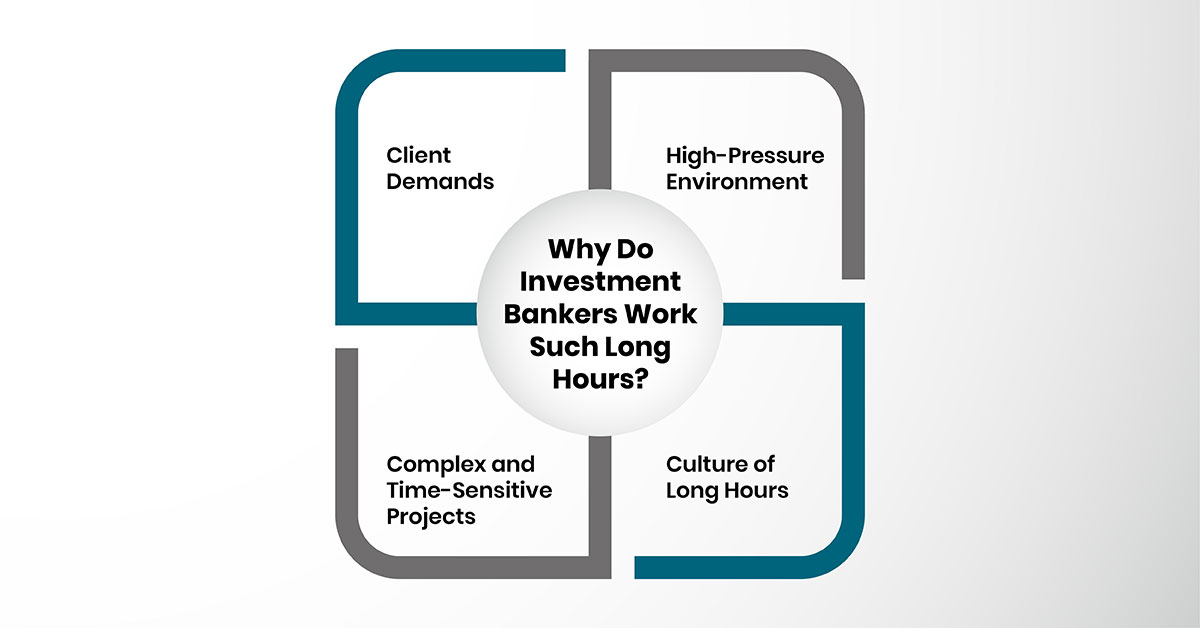Introduction
The investment banking career path entails long, tiring working hours, some officials work more than 100 hours weekly. Even though Investment Banking Hours were severe in the past, this article seeks to describe the conventional hours and myths surrounding reality. Knowing what Investment Banking working hours are in accurate terms is important to anyone pursuing a career or already working in the pressured environment of investment banking.
The Structure of Investment Banking Workdays
Investment banking jobs are quite dynamic, and a classic workday can be different considerably from one role to another and one department. While the variability can be great, some core activities define what a banker’s day looks like.
Key Components of a Workday:
-
Analysis and Research: A big part of the day, especially for junior bankers, deals with reviewing financial models, preparing valuation reports, industry analysis, etc.
-
Client Interactions: Meetings with clients to discuss deals, pitching ideas, or informing clients on doing projects.
-
Internal Coordination: Working together with colleagues across the departments to find common ground on things that must be delivered and settle on deal timelines.
Factors Influencing Work Hours:
-
Department-Specific Tasks: Deal closures generally mean M&A teams can work longer hours, while capital markets’ roles may fluctuate with market activity.
-
Client-Centric Deadlines: Clients' high expectations demand swift, client-centric responses, a trend that often leads to extended working hours in the industry.
-
Global Market Operations: Schedules can become even more complicated with cross-border deals because you need to adapt to different time zones.
The Myth vs. Reality of the 100-Hour Workweek
The image of the 100-hour workweek in investment banking has entered the cultural repertoire, shaped by popular culture, fun and fact, and the tales of veterans in the industry. But this image doesn’t always match the course of most professionals in the field.
-
Origins of the 100-Hour Myth: The myth probably arises from the high-pressure environments accompanying major deals, especially in the mergers and acquisitions deals (M&A) space. These deals are workhorses, and they’ve got to be worked on in intense, time-sensitive work, which makes it seem that everyone in banking works 100-hour weeks.
-
Realistic Averages: Extensive hours on the most challenging roles, particularly at critical deal phases, can be required, but the average workweek differs greatly among roles. The peak workloads for analysts are between 70 - 90 hours per week, but that isn’t always the case. Hours tend to average between 50-70 hours, but for many in the industry, including people in less intense departments, this just isn’t it for most people.
-
Changes in Working Hours: The investment banking sector is adapting to modern work culture, making way for a better work-life balance, and creating an impact on working hours. Despite hours that continue well past the break of day, new practices and technology are reducing the need for an excessive number of hours.
The Impact of Long Hours on Bankers
Investment Banking Hours can have a huge impact on the physical and mental well-being of bankers for extended periods. The industry works in such an intense and high-pressure environment that often leads to fatigue, burn, and stress, all of which have a really negative effect on one's health. As a result, it is rare to find a decent balance between work and life, and this can be detrimental to relationships and overall well-being.
Key Impacts Include:
-
Physical Health: Prolonged work implies decreased sleep, improper nutrition, and lack of physical activity, which are contributors to heart ailments and other diseases.
-
Mental Health: Most professionals working under such pressure suffer from stress and anxiety. As you cannot disconnect from work, mental fatigue worsens which might lead to burnout.
-
Career Sustainability: In the short term, long hours contribute to financial rewards, but in the long term the negative effects on health lower career sustainability and increase turnover rates within the industry.
Despite all these challenges, many firms are now beginning to appreciate the role of employee well-being and have started to establish initiatives aimed at reducing these consequences – for instance, mental health support, flexible working hours, and improved physical health resources.
Why Do Investment Bankers Work Such Long Hours?
The nature of investment banking often sees investment bankers working long, long hours, mainly on high stakes deals with short deadlines. The primary reasons for these extended investment banking hours include:

-
Client Demands: Investment bankers are on call at all times for client meetings, updates, and important requests, during critical deal phases.
-
High-Pressure Environment: Investment banking is a competitive atmosphere whereby professionals are driven to do more and more. This means working late into the night to achieve expectations.
-
Complex and Time-Sensitive Projects: The work of dealing with structuring, financial modeling, and due diligence requires intense focus and substantial time commitment. Bankers must work extended hours in multiple deals with global coordination.
-
Culture of Long Hours: Traditionally, the investment banking industry's culture has been built on the notion of a lot of 'face time', depicted by a lot of long hours played for dedication and commitment.
-
Fast Career Advancement: Bankers accept the long working hours because the promotional ladder depends on the employee’s ability to meet high work demands and therefore different employees sacrifice their off time for the sake of promotion.
Compensation and Career Growth
High compensation and fast career advancement are often paired with investment banking Hours that are too demanding. Analysts and associates indeed keep long working hours, but they are well compensated through their substantial investment banking salary, bonuses, as well as commission. The high-pressure environment, plus the amount of value that these facilitators bring to their firms, explains these financial benefits.
-
High Compensation: Attractive pay packages, including base salary, bonus, and stock options compensate for the hours in its utility. For an early-stage investment banking career path, these can be very lucrative compared to many other industries.
-
Accelerated Career Growth: The workload allows the professional to be inundated with opportunities to gain large amounts of experience in a short time. Dealing with intricate transactions and communicating with top-shelf customers situation bankers to excel, thus receiving promotions to other levels faster than most other professionals. The high growth rate open one to a senior position like a Vice President or Managing Director within a decade.
-
Skills Development: Professionals working long hours exposed to financial modeling, strategic decision-making, and client relationships develop expertise that is very much appreciated in their profession.
Steps Towards Maintaining Work-Life Balance in Investment Banking
Over the last few years, the investment banking hours have undergone big changes. Firms are increasingly coming to recognize the importance of work-life balance and the well-being of their employees as well as maintaining a sustainable workforce. To overcome this challenge and even redefine the investment banking working hours, several steps are taken.
-
Flexible Work Arrangements: Investment banks are implementing flexible schedules and hybrid working for employees to deal with their time the way they prefer. That also includes permitting remote work or shortening work weeks to cut back on burnout.
-
Automation of Repetitive Tasks: Automation tools are being integrated into administrative and repetitive tasks so that analysts and associates can spend time on more urgent work and save long evenings on trivial matters.
-
Improved Wellness Programs: Health and wellness are top of mind for the firms that are handless in banking, the physical and mental. The idea is to have these initiatives support employees in the management of stress, through fitness memberships to counseling services.
-
Cultural Shifts: Leaders have become more outspoken about breaking the practice of long working hours and promoting healthier work practices. Many top executives now lead by example, leaving the office at a reasonable time to set a good precedent.
Conclusion
The nature of investment banking hours being arduous for the most part determines investment banking as a career path. Work-life balance is becoming more prominent in the industry and is addressing it through flexibility and innovation, while typically being attached to long hours is associated with money and growth in a career. AI in investment banking is likely to redefine investment banking working hours to become healthy, while still meeting performance and client service requirements as expectations change.

